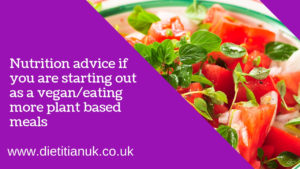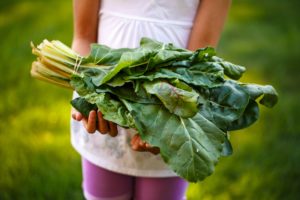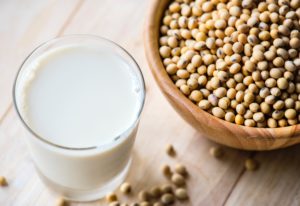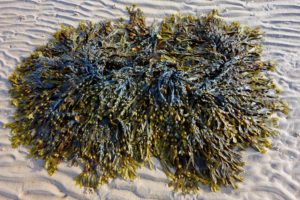What are the benefits?
Plant based diets (PBD’s) are better for the environment and provide a more sustainable way of eating. There are also health benefits due to eating more plants altering the nutritional profile of your body.
PBD’s tend to be lower in saturated fat due to less meat. They usually contain higher amounts of fruit and vegetables which means higher fibre content for digestive health (those bowels) and a greater range of antioxidant plus phytochemicals.
The inclusion of wholegrains provides B vitamins and fibre, beans/pulses for soluble fibre and these help with blood sugar control, soy products provide phytoestrogens that can be helpful in the menopause plus nuts and and seeds that are packed with antioxidants and micronutrients.

Some specific health benefits:
Research shows us that PBDs can lead to lower levels of total and low-density lipoprotein (LDL) cholesterol levels. This is going to reduce the risk of cardiovascular disease.
Also improvements can be seen in serum glucose levels which helps in overall health and in type 2 diabetes control.
There has been shown to be a lower level of overall inflammation in the body. These factors combines are thought to contribute to a reduced risk of chronic diseases.
Does this mean we should all go vegetarian/vegan? Well not necessarily. What I do think it means is that having a greater emphasis on eating plants sources of food is helpful and healthful. As with all ways of eating there are many ways to do it, so the benefits you see on paper will depend on how you actually approach this way of life. This in my mind is about adding in plant foods more than taking things away.
Will I be missing out nutrients?
It is perfectly possible to meet your nutritional needs on a PBD. However you will need to be more intentional about it. Planning and being thoughtful about some key nutrients plus a couple of supplements will ensure you get all your body needs.
Protein : It can be easier to get protein from animal sources. However this doesn’t mean we shouldn’t be eating plant proteins! Most people in the UK are exceeding their protein needs, especially with the focus on protein in so many snack foods right now. When calorie needs are met it is more than possible to meet your protein requirements on a PBD. However it is a good idea to vary your protein sources through the week so that cover all those essential amino acids the body needs.
- Mycoprotein, soya protein and pea protein
- Beans and lentils
- Nuts and seeds
- Tofu
- Eggs and dairy (if these are eaten)
Iron : The recommended daily amount of iron for vegetarians is 1.8 times higher that for non-vegetarians, as iron which comes from plant sources (non-haem iron) is less efficiently utilised in our body than iron which comes from animal sources. Eat iron rich foods daily and all should be well.
- Iron fortified breakfast cereals
- Beans
- Nuts and seeds
- Wholegrains
- Dried fruit
- Green leafy vegetables
- Yeast extract
- Eggs, fish and poultry (if these are eaten)

Calcium: one of my hobby horses, as I like to look after my bones. Calcium can be lower on a plant based diet but there are plant foods that will help those bones stay strong. Check your plant based milk is supplemented and get on those leafy greens. Some studies show a lower bone mineral density in those not eating dairy, so this is definitely a nutrient to think about.
- Fortified dairy alternatives (like: soya or nut milks and yoghurts)
- Fortified juice drinks
- Green leafy vegetables
- Dried fruit
- Tofu
- Beans, lentils and chickpeas
- Nuts and seeds
- Bread

Vitamin B12: as this is mainly found in animal products it is one of the nutrients you may end up lacking. It is found in yeast extract and most multivitamins/minerals.
Omega 3 : mainly talked about as being in oily fish but also found in seaweed, linseeds and walnuts. If you know you won’t take in many of these foods you could take a supplement.
- Seaweed (not recommended more than once per week)
- Chia seeds, linseeds/flaxseeds, hemp seeds
- Rapeseed oil
- Walnuts and walnut oil
- Soybeans and soybean oil
- Tofu
- Spreads and breads which are fortified with omega 3
- Oily fish (if this are eaten)
- Eggs and dairy which are fortified with omega 3 (if these are eaten)

Iodine: highlighted in some studies as a nutrient that can be low on a PBD, but also on a meat eaters diet too!
- Iodised salt
- A limited amount of fortified dairy alternatives (e.g. specific brands of oat milk)
- Seaweed (but this is not recommended more than once per week)
- Dairy products and seafood (if these are eaten)
Selenium: mainly found in Brazil nuts so not necessarily a problem on PBD but a good one to be aware of.
- Brazil nuts
- Eggs and fish (if these are eaten)